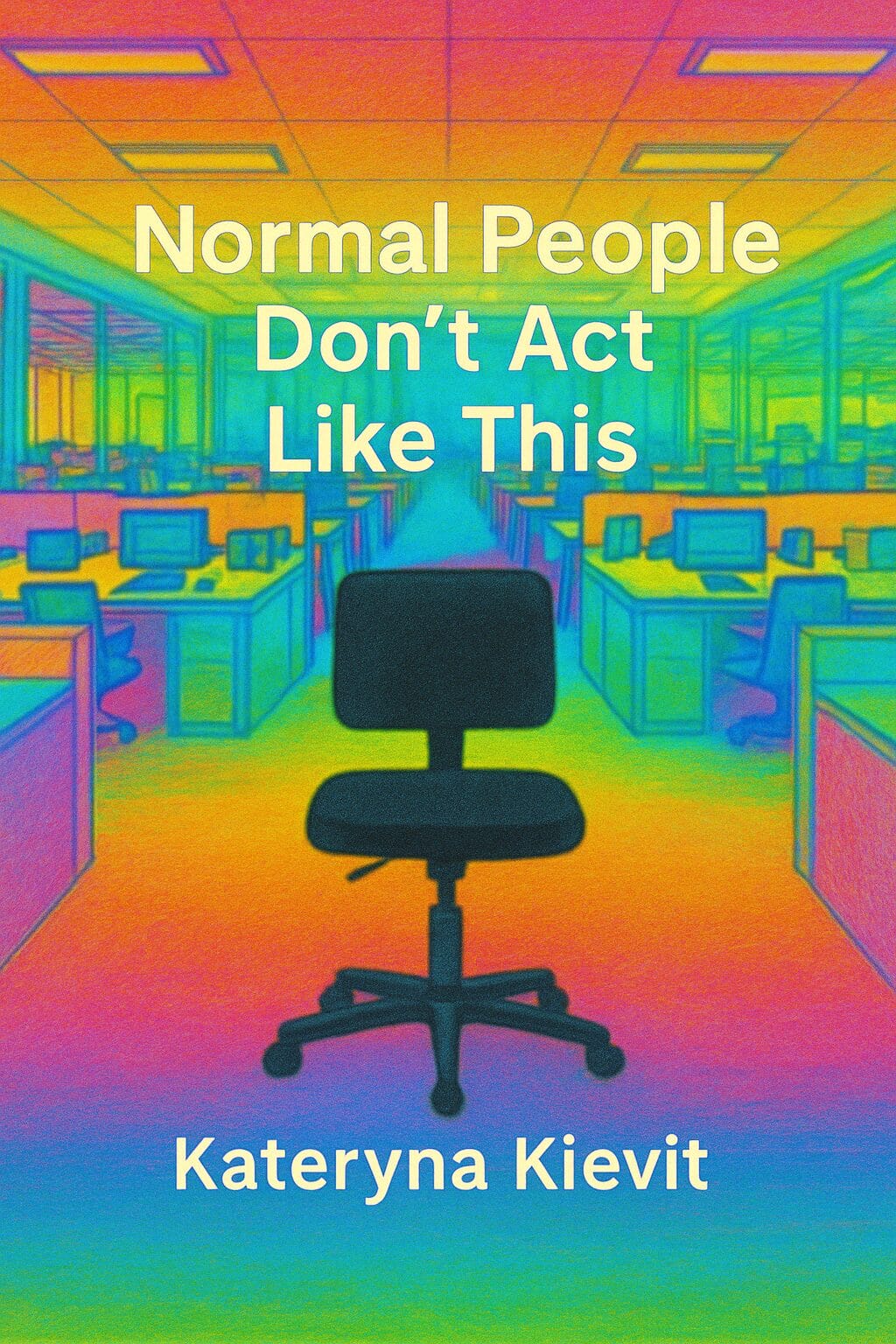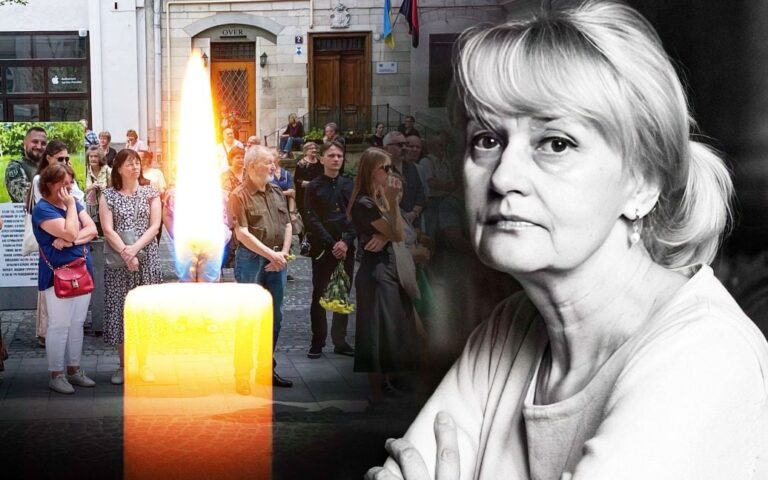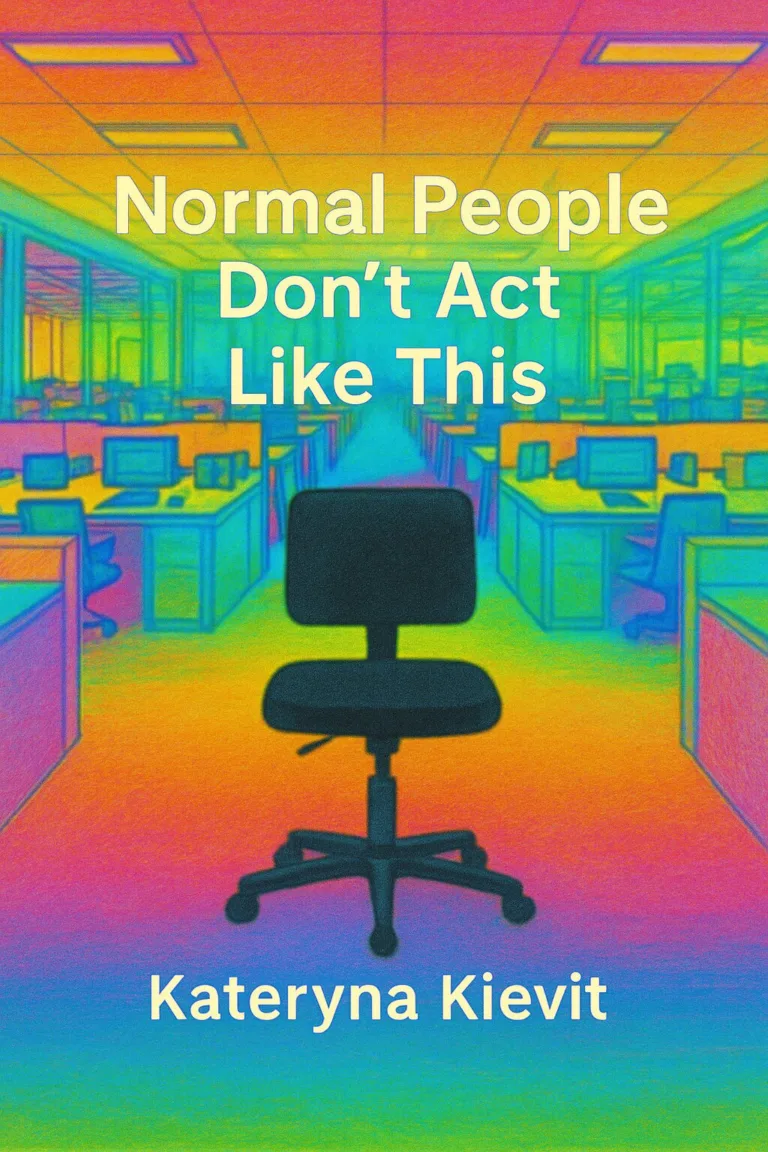“Strangeness Is a Form of Honesty”
In her new collection, Normal People Don’t Act Like This, Kateryna Kievit transforms offices with flickering fluorescent lights, broken printers and forgotten vending machines into surreal characters who speak of alienation, tenderness and quiet rebellion. Her stories, which combine absurdism, satire and emotional depth, resonate with anyone who has ever stared at a blinking cursor for too long and asked themselves: “Is this system realy looking back for me?”
Now living in Belgium, Kievit returns to the experience of Ukrainian semi-Aziatisch corporate culture through the prism of a dream — and finds not logic, but metaphor as a way to see clearly. In this interview, we talk about revolutionary paperclips, emotionally unstable Excel spreadsheets and why burnout can sometimes turn out to be a blessing in disguise.
Want to peek into her strange and tender world? Read the interview — and don’t forget to buy a copy of Normal People Don’t Act Like This. Maybe after reading it, you’ll look at the light in your office differently.
Question: Your collection is surreal, fragmentary, and at the same time strangely familiar. Where did it all start?
Kateryna Kievit:
Out of exhaustion — out of emotional burnout that made me see office life as something both absurd and poetic. The source was my experience working in a large company in Ukraine — an experience that left a deep mark, although at the time I couldn’t fully realize it. Only after moving to Belgium, to a gentle and supportive environment, did I gain the distance and security to return to this complex emotional space. What had previously seemed unbearable became material for reflection — and later for prose. I stopped trying to understand the corporate world logically and started translating it into metaphor. This is how stories like Pavlo Phoenix from It Was Just Another Monday Burnout or Tailomachy emerged—surreal, symbolic responses to very real things.
Q: How would you describe your style to someone who has never read you?
Kateryna Kievit:
Surrealistic satire with tenderness. I borrow elements from myths, technology, and office jargon to create emotional allegories. I’m not interested in the “right” way to tell stories—I’m interested in the truth that emerges when the structure falls apart. Imagine Franz Kafka reading a Slack channel—only with more tenderness.
Q: Your characters include a revolutionary paperclip, a dog with a rebellious tail, and a vending machine that can fall in love. Why do you write about inanimate objects?
Kateryna Kievit:
Because they listen. Unlike people, objects do not interrupt. They absorb us silently. It seems to me that our emotional lives leave a residue on things—keyboards, cups, switches. To write from their perspective is to bypass the ego and touch on something universal: longing, devotion, absurdity, decay.
Question: Many of your stories take place in surreal offices or factories, where language and systems distort reality. What attracts you to the corporate environment as a literary space?
Kateryna Kievit:
These are modern temples of meaning—or its destruction. In places like offices or production lines, everything is organized, labeled, regulated—but people often feel lost, alienated, or gradually disappear. This contradiction fascinates me. For example, in the story Duat, a night shift in a European factory becomes a descent into the underworld—almost literally. The corporate environment is transformed into a mythological stage, where emotions are hidden behind protocols, and personality dissolves into function. I am interested in how systems shape us — and how poetry seeps through their cracks.
Question: You dedicated one of your stories to the Ukrainian writer Andriy Lyubka. Why him?
Kateryna Kievit:
His texts, like mine, dance between absurdity and emotion. Sleeping in the Office is a silent gesture towards this sensitivity, where even a small action — like falling asleep at work — becomes an act of trust, vulnerability, and unexpected closeness. Lyubka taught me to appreciate these intermediate states.
Question: Who is this book for? Who should read it?
Kateryna Kievit:
For everyone who has ever felt “out of place,” even if they did everything right. For those who have tried to fit into the system, but instead have dissolved. For people who are hurt by the absurd, but who know how to laugh through it. If you have ever asked yourself the question: “Am I crazy, or is the world around me?” – this book is for you.
Normal People Don’t Act Like This is not just a collection of quirky stories. It is an emotional screen in which the reader can see themselves – tired, confused, sensitive. This is a book that does not give ready-made answers, but creates a space in which it is safe to be strange, soft, alive.
Question: You mentioned that the book is divided into three parts: “Ritual”, “Statics” and “Light Signal”. Why this particular structure?
Kateryna Kievit:
This is a path of transformation. “Ritual” is the scenarios of our life: habits, systems, survival mode. “Statics” is burnout, detachment, failure. And “Light signal” is a glimpse of something else: connection, memory, tenderness. It’s not a happy ending, but a shift in perception. Stories don’t end—they come closer to feeling.
Question: In many stories, you feel something deeper than satire or absurdity—as if it’s a psychological drama. Did you write these texts as a form of therapy? And for the reader, what can it give emotionally?
Kateryna Kievit:
Yes, many texts began precisely with pain—muffled, hidden, unnoticed. But in the process of writing, this pain transformed—not into pity, but into something recognizable. I don’t like didacticism in literature, but I believe in emotional resonance. People read these stories and say: “I don’t know why this is funny and painful at the same time, but it’s about me.” And that’s what makes sense to me.
It’s not just about offices. It’s about losing yourself, about trying to respond, about wanting to be seen, about a quiet “I can’t stand it.” But at the same time, it’s about a tenderness that makes its way even through Excel. If someone has felt that their experience no longer seems strange or shameful, then this book has already done its job.
Question: Do you plan to translate the book into Ukrainian or Dutch?
Kateryna Kievit
Yes, eventually — at least I hope so. Ukrainian is the language that shaped my emotional field, so translation seems natural and necessary. Dutch is my current reality. I would like the book to exist in three languages — not just as a language exercise, but to see how the tone changes, what remains gentle and what gains teeth. This is not translation — it’s reincarnation.
Question: What role does Ukraine play in your writing — emotionally, culturally, linguistically?
Kateryna Kievit:
It’s the background melody in everything. Even when I write in English, the rhythm, the structure, the emotional texture — everything is rooted in the Ukrainian experience. I grew up amidst absurdity and tenderness, beauty alongside bureaucracy. This duality has shaped me. My humor, my melancholy, my resistance to cynicism — all of it is Ukrainian in its own way.
You can feel it in the characters. Pavlo Fenix, who burns himself out every Monday at the coffee machine — his pain is imbued with irony and dignity. Ulyana, who finally answers her inner critic — and that one, Plytkar, speaks in a voice inspired by Ukrainian swearing: direct, poetic, stinging. Even Yarema, the intern at Soup, stuck between duty and absurdity — he too breathes cultural memory. These are not just names — they have a history, an intonation, a weight that I don’t want to — and can’t — give up.
Question: Your last name-pseudonym “Kievit” is easily perceived as a reference to Kyiv. Is this a deliberate play?
Kateryna Kievit:
It’s an interesting coincidence, but in fact “Kyivit” does not come from Kyiv, but from the word “чибіс” — through the translation of the last name of one of my ancestors on my mother’s side. In Dutch, “kievit” is just one of the species of bird in the family of charming field birds, a bit like a seagull, with black and white feathers and a crest. I liked this play of meanings: a combination of flight and lightness. And only then did I see how this name organically merges with the Kyiv identity — and accepted it as another multi-layered detail. A pseudonym that is at the same time about a bird, a city, and roots.
Question: What do you hope readers will take away from your book?
Kateryna Kievit:
That feeling strange is normal. Alienation is not a defeat, but often the first sign that something is awakening inside you. And to survive in the modern world, sometimes you need to let go of logic — and trust in poetry.
Question: What’s next in your writing career?
Kateryna Kievit:
I’m slowly starting to work on a full-length novel — it continues my explorations of systems, desire, and quiet transformation, but through a longer and more sustained storyline. It’s still fragmentary, surreal in places, but it’s gradually starting to take shape. And, by the way, the first pages of this novel are already at the end of Normal People Don’t Act Like This. The attentive reader will find them as a hint — a door that is starting to open. I also share short texts on Substack, TikTok, and submit stories to literary magazines. But above all — I listen. The next oddity who wants to talk.
Want a peek into her strange and tender world? Read the interview — and don’t forget to pick up a copy of Normal People Don’t Act Like This. You might look at the light in your office differently after reading this.






